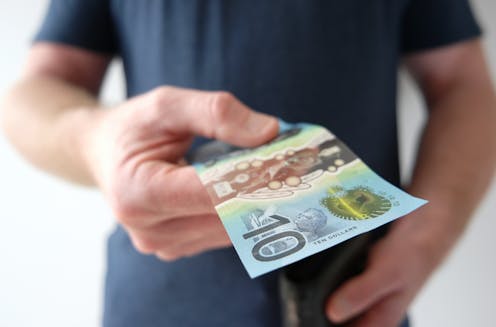Trying to save money? Our research suggests paying in cash – while you still can
- Written by Lachlan Schomburgk, PhD Researcher in Marketing, University of Adelaide

Cash is in crisis. In Australia, it’s now only used for 16% of in-person transactions, down from about 70%[1] in 2007.
The situation is so dire that on Monday, independent federal MP Andrew Gee introduced a private member’s bill[2] that would force businesses to accept cash or else face big fines.
The reality is that over the past decade, technological advancements have utterly transformed the way we pay for goods and services.
Phones and smartwatches can now easily be used to pay by card, and buy-now-pay-later schemes and cryptocurrency payments offer further alternatives.
The shift away from cash only accelerated[4] throughout the COVID pandemic, as health experts recommended avoiding using it for hygiene reasons.
Despite these big changes in how we spend money, Australians have perhaps been more focused on how much amid a stubborn cost-of-living crisis.
In light of this, our research team wanted to investigate how our choice of payment method can interact with our actual spending habits.
Our latest research[5] offers a simple solution for anyone looking to save money — carry more cash!
Read more: Money transporter Armaguard is in peril. Could cash be dead sooner than we think?[6]
We pay less when we pay cash
Drawing on both academic and industry sources, our research team combined the results from more than four decades of prior research on spending behaviour and payment methods into a large dataset.
This data spanned 71 research papers, 17 countries, and more than 11,000 participants. State-of-the-art meta-analysis techniques then allowed us to collectively analyse the results from all these prior studies, and re-examine their insights.
We found that cashless payments were indeed associated with higher levels of consumer spending compared to cash transactions, something that is referred to in the literature as the “cashless effect”.
This cashless effect was consistent across all other payment methods in the data set.
Put simply, it doesn’t matter whether you use a credit card, debit card or a buy-now-pay-later service – you are likely to spend more money using cashless methods than when you pay with cash.
The pain of paying
Under the traditional economic view that consumers behave rationally, there should be no differences in spending behaviour between different payment methods – money is money after all.
But the existence of the cashless effect shows that the payment methods we use do indeed influence our spending behaviour.
The leading theory to explain this effect attributes it to differences in the “pain of paying”, a concept first coined in 1996[7] that describes the emotions we feel when spending money.
Importantly, our choice of payment method can influence the level of pain felt.
When paying with cash, we have to physically count out notes and coins and hand them over. Humans seek to avoid losses, and paying by cash sees us physically lose a tangible object.
Conversely, nothing has to be handed over to pay cashlessly. We don’t lose anything tangible with a swipe or a tap, so it feels less painful.
Preliminary neurological evidence suggests that the “pain of paying” isn’t just an abstract metaphor, and we may feel actual psychological pain with each transaction we make.
Research[9] employing functional magnetic resonance imaging (fMRI) scans to observe brain activity in consumers has shown that paying activates brain regions related to experiencing psychological discomfort.
Picture this: You’re at a theme park, excited for a fun day. You use your smartwatch to pay for snacks, souvenirs and rides. It’s all so convenient that you don’t realise how much you’re spending until you check your account later and see that you have completely blown your budget!
This is the cashless effect in action − if nothing is physically handed over, it’s easy to lose track of how much is spent.
A great tool for budgeting – while it lasts
The cost of living crisis has made spending control front-of-mind for many people. Our meta-analysis suggests that returning to “cold hard cash” whenever possible could be one valuable tool to help.
The increased friction felt when using cash could help people better control their money, even just by providing a moment to pause and consider whether a transaction is necessary.
This could help individuals make more mindful decisions, saving money while they can in an increasingly cashless world.
References
- ^ about 70% (www.rba.gov.au)
- ^ private member’s bill (www.smh.com.au)
- ^ Christiann Koepke/Unsplash (unsplash.com)
- ^ accelerated (www.worldbank.org)
- ^ latest research (www.sciencedirect.com)
- ^ Money transporter Armaguard is in peril. Could cash be dead sooner than we think? (theconversation.com)
- ^ first coined in 1996 (www.researchgate.net)
- ^ Michael Leslie/Shutterstock (www.shutterstock.com)
- ^ Research (papers.ssrn.com)
- ^ StockLite/Shutterstock (www.shutterstock.com)
Authors: Lachlan Schomburgk, PhD Researcher in Marketing, University of Adelaide














